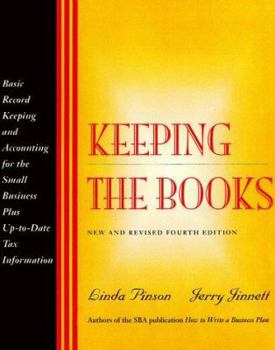Keeping the Books: Basic Recordkeeping and Accounting for the Small Business
Select Format
Select Condition 
Book Overview
Called "one of the most comprehensive, accessible books for small business owners" by "Money Book Club", this smart guide aids readers in maintaining accurate business records by providing the... This description may be from another edition of this product.
Format:Paperback
Language:English
ISBN:1574101072
ISBN13:9781574101072
Release Date:January 1998
Publisher:Kaplan Publishing
Length:212 Pages
Weight:1.25 lbs.
Dimensions:0.5" x 8.4" x 10.9"
Customer Reviews
5 ratings
Bookkeeping for dummies - brilliant!
Published by Thriftbooks.com User , 22 years ago
When I started my first business, I found this book priceless: step-by-step instructions on how to keep business accounts and what accounts need keeping, and when to update them. The appendix contains templates of all the major records needed for a small business. For someone who knew nothing this was a real lifebelt. Very easy to read, and immediately useful.
Great book!
Published by Thriftbooks.com User , 22 years ago
This is a really great book for beginners. I'm not a proffesional accountant (my primary area is computer systems administrations) but I have been working in banks for 5 years and I read a lot of books about accounting basics because it was part of my job. And usually those books were either too practical or too academic. But this one is perfectly balanced. It explains you not only what to do but it also gives you a pretty solid background why you should do this and what for. It shows you a complete picture of a small company accounting including major forms, reports shedule, books etc and that's all in just 200 pages. It's amazing how the author can explain in a couple words some concepts which usually takes a whole chapter in some other tutorials. You can read it to just to get some idea about accounting wording and concepts, or you can keep it on the table and use as a Howto giude in your everyday work, it works both ways. And it's pretty fairly priced. Very, very nice book!
Must own book!
Published by Thriftbooks.com User , 23 years ago
This book contains a lot of good information. It is aimed towards people who don't have a background in accounting/recordkeeping...but who maybe know the basics.I was able to get answers to a number of questions I had as far as how the details of accounting work.The book does focus mostly on the single-entry method of accounting, as opposed to the double-entry system.
Great Book For Small Business People
Published by Thriftbooks.com User , 24 years ago
"Keeping The Books: Basic Record-Keeping and Accounting For The Small Business" by Linda Pinson and Jerry Jinnett is an excellent introduction to record-keeping and accounting for small business owners. The book does a solid job introducing record-keeping. It discusses the:General Journal General Ledger Petty Cash Record Inventory Records Fixed Asset Log Accounts Receivable Accounts Payable Independent Contractor Record Payroll Records (though the authors recommend you hire a payroll firm to handle your payroll due to the government's extreme demands for payroll records) Mileage Log Travel Expense Records Entertainment RecordsSample forms of all of the above are given and explained, as well as blank forms the authors state you can copy and use for your business. Today most of us would put such records on a computer, but we should still understand the process, the authors point out."Keeping The Books" is especially good, as it discusses, not only single-entry accounting, but also gives a decent introduction to double-entry accounting. The brief explanation, though very good, is not as good as taking an introductory class in double-entry bookkeeping. Taking a basic bookkeeping class is one of the best things a new business owner can do.For example, "Keeping The Books" casually mentions there are two sides to any business transaction and the two sides are recorded as debits and credits. Then it lists the rules for how revenue, expense, asset, liability, and equity accounts are affected by debits and credits. (Debit increases the value in an asset account; a debit decreases the value of an equity or liability account, etc.) Debits are entered on the left-hand side of the column and credits are entered on the right hand side. But, it is never explicitly stated that the one giving in the transaction is the credit(or) and the one receiving in the transaction is the debit(or). A simple rule like that makes understanding double-entry accounting much easier. For example, if you sell one hour of your service, Service Revenue is the giver (so it's credited) and cash is the receiver (so cash is debited) and increased. Many people new to accounting benefit from having that point *explicitly* mentioned, though some might say it is obvious.But, overall, the introduction to double-entry accounting is solid, extremely readable and not overly long. Adjusting the entries at the end of an accounting period is also discussed."Keeping The Books" goes into basic financial statements--balance sheet, income statement (or profit and loss statement), projected cash flow statement. These topics are very well-explained and will benefit the small business owner. Pinson and Jinnett show how to put all the statements on a comparative basis to examine percentage value changes. For example, on the income statement, let sales' revenue be 100% and, then, examine all costs and expenses (and hopefully profit!) as a percentage of sales. This hel
Well Written for Non-Accountants/Bookkeepers
Published by Thriftbooks.com User , 24 years ago
This book is excellent and well written for people who are NEW to bookkeeping/accounting for small business. I especially found the checklists provided (when to pay various Federal and State Taxes, to whom to pay various Federal and State Taxes, when to produce certain financial reports, what to have ready for your Tax Accountant at year end and in what format) to be VERY useful. EXCELLENT reference book for the do-it-yourself bookkeeper.




